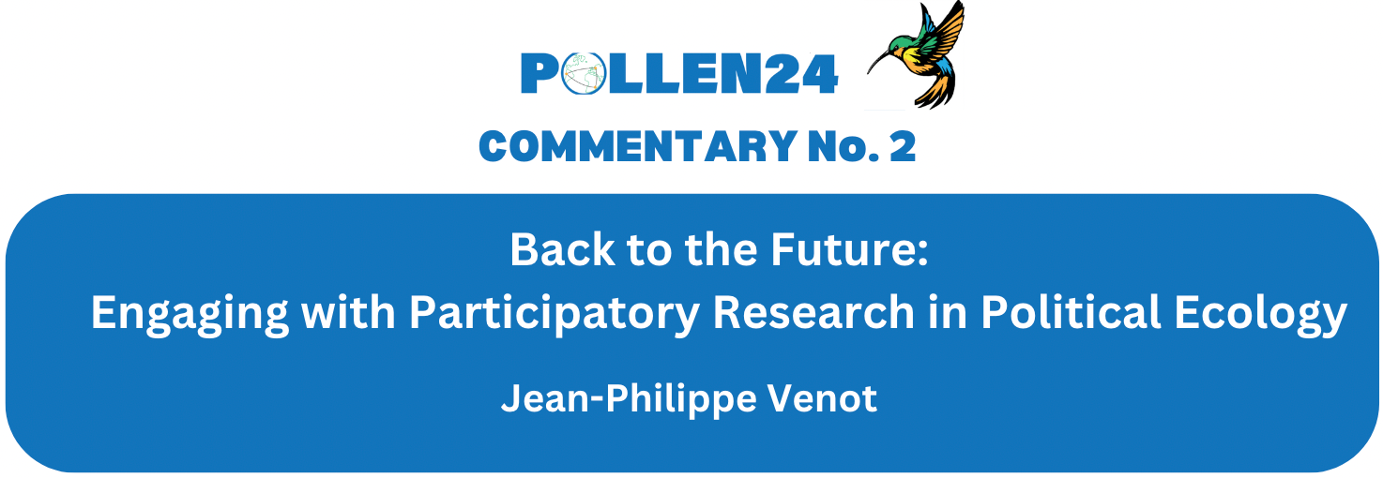2024-04-02
Back to the Future? Engaging with Participatory Research in Political Ecology

Abstract
Back to the Future? Engaging with Participatory Research in Political Ecology
My research contributes to the broad and plural field of Political Ecology. More specifically, I study the mutual shaping of water and society that takes place within, around, and against development interventions in irrigation and water governance in selected countries of sub-Saharan Africa and South East Asia. I work for the French National Research Institute for Sustainable Development (https://en.ird.fr/node/8), whose stated aims is to develop equitable research partnerships with higher education and research organizations in the Global South. This tends to involve posting (mostly) French researchers in national universities and research centers for several years during which time we design and implement research projects together. This specific positioning raises many questions in terms of legitimacy and ethics, which are not easily answered. I am also part of an epistemic community designing and implementing participatory research that often involves ‘modeling with stakeholders’. The vocabulary used by this community may be less oriented to the ‘political’ than the one used by political ecologists, but the two communities share the same aspiration: broadly speaking, to support and increase the clout of marginalized social groups, and redress existing environmental and development inequalities.
As both a political ecologist and a participatory researcher I do not feel that the differences between these two epistemic communities are so fundamental that they cannot talk to each other. Yet, I am struck by the fact that I can only find a few examples in the literature where the language of Political Ecology and that of participatory research are explicitly used together, especially over the last 15 years. As I tried to work out the possible synergies and inconsistencies between the two fields, I asked more experienced colleagues why this might be the case. A possible explanation quickly emerged, one that supported my own intuition and points to the ‘radical’ ambition of (some) political ecologists. These colleagues highlighted that the word and concept of ‘participation’ was inextricably linked to those of (sustainable) ‘development’ and of (participatory) 'development practice' (in the context of projects generally financed by Western hegemonic organizations in countries of the Global South, often through their state apparatus). From the start, contributors to the field of Political Ecology, and particularly anthropologists, have been critical of development – be it participatory or otherwise. Their reluctance to use a term so closely associated with that concept, even if in conjunction with the word ‘research’, was rather unsurprising as a consequence.
Beyond this question of language, they also stressed that there were fundamental issues as to how redressing existing environmental and development inequalities should happen. For many political ecologists, this involves emancipation, which cannot be granted but needs to be fought for. This implies conflict, resistance, and the radical transformation of current actor-network configurations, which will always involve exclusion (but of different actors than those currently excluded). On the other hand, participatory research often presupposes that improving and re-balancing representation in decision-making (which is contingent and value-laden) can go a long way to address current instances of dispossession. As it is about improvement, this means working within existing actor-network configurations – and ‘nudging’ them, more or less substantially. For many political ecologists, this is an illusion; instead of being a driver of change, participatory research contributes to the reproduction of existing disciplining frameworks. Hence their reluctance to use the terminology.
Finally, there is no denying that participatory research approaches (that constituted a significant breakthrough for development practices when they were proposed by the likes of Robert Chambers four decades ago) are increasingly used by corporate actors or development agencies. In such configurations, it is often the case that participatory research is instrumentalized and used to legitimize and strengthen the (neoliberal) views and agendas of those who organize the research and often seek the commensuration of nature as opposed to the priorities of those invited to participate. This acts as a further deterrent for political ecologists to use the vocabulary of participatory research. Nobody in the field wants to be associated even remotely with these forces of exclusion –I don’t.
No doubt, political ecologists engage with a multitude of actors in their research and do so in a myriad of ways. For the reasons laid out above, however, the vocabulary of participatory research has been replaced in large part by an ever-wider variety of terms. These include, but are not limited to, activist-research, transdisciplinary research, transformative research, co-production (of knowledge), participatory (action) research [sic] (does the addition of the word 'action' address the issues raised above?). Calls for feminist and more generally decolonizing research approaches multiply, and terms such as 'counter-mapping' replace good old 'participatory mapping'. Political Ecology tells us that words matter. If using other terminology can help us to disassociate from the nightmarish description of participatory research presented above, this is good news. But changes in terminology do not necessarily correlate with changes in practices. More prosaically, it may well reflect a not-so-desirable tendency in academia towards conceptual inflation.
Beyond labeling, the extent to which and how approaches adopted by political ecologists may differ from ‘good old’ participatory research should not be taken for granted but rather needs to be assessed through the lens of their operationalization. The devil is in the detail, and turning our attention to our own research and discursive practices has never been so important. Simply rejecting participatory research on discursive grounds, regardless of the diversity of ways in which it is being practiced, by whom and for what purpose, does not seem in line with what Political Ecology teaches us. Let’s not articulate a monolithic narrative of our own, while a key contribution of the field is precisely to unpack such narratives when elaborated by others. Participatory research does not have to be the instrumentalization of marginalized voices for the pursuit of a not-so-hidden dispossession agenda. In fact, beyond grand statements, little academic flags, and endless semantic discussions, I suspect many of the day-to-day activities of political ecologists could easily come under the umbrella of participatory research approaches and vice-versa: one-to-one discussions and instances of collective engagement (workshops, group discussions, etc.) that are attentive to differences and conducted with care, and that take place over long period of time, experimentations with different modalities of knowledge production including visual approaches, participatory [sic] observation, etc. It does not mean that Political Ecology is equivalent to participatory research, or that all participatory research is driven by the concerns of Political Ecology, but there are possible overlaps.
Why then this concern over terminology and this attempt at reclaiming the vocabulary of participatory research in Political Ecology? The main reason is that I think it offers an avenue to articulate a pragmatic politics that can support mundane positive changes – a politics that I personally find commensurate with my own positionality. The fact that political ecologists are critically cognizant of the (vocabulary of) participatory research, and rightly so, is the very reason why I think the field should engage with it in a more affirmative way than it does currently. It has actually done so in the past – hence the title of this short piece. Indeed, I think these critiques can be ‘activated’ to support participatory research that does not amount to depoliticizing and instrumentalizing – quite the contrary. Such participatory research, like Political Ecology, could draw from Science and Technology Studies or actor-oriented approaches to development. These two fields not only offer powerful analytical frameworks to decipher the nitty-gritty practices and actor-networks involved in knowledge-making and development, but in so doing they also provide ‘operational levers’ for us to intervene in these networks strategically and possibly change practices. To give but one example: identifying the strategies of brokerage and interessement deployed by specific actors can, in turn, inform our own engagement strategies to build supportive coalitions around positive changes in development practices and environmental management.
Language does matter, and it is important to recognize that such an approach (I resist the temptation to come up with yet another term) reflects a pragmatic politics whereby incremental changes happen from within existing governing frameworks. I see the appeal of calling for radical transformation (especially among academics), but while we hope, wait and try to bring it about, maybe can we also actively engage in more mundane but necessary positive changes, if only for the benefit of people involved in the research. It does not have to be the radical transformation of structures of domination (which is, by the way, more likely to happen unexpectedly rather than by being engineered by academia) or nothing. Over time, incremental changes in the attention given to different practices, worldviews and voices amount to a lot: we only need to look at how the field of political ecology has evolved over the last 40 years.
Acknowledgements
I would like to thank Simon Batterbury, Léo Biré, Rutgerd Boelens, Frances Cleaver, Floriane Clément, Guillaume Lestrelin, Erik Swingedouw, Romain Valadaud, Luke Whaley, and Margreet Zwarteveen for exchanging thoughts on an apparent lack of overlap between the vocabulary of participatory research and that of political ecology and/or for commenting on a first version of this contribution. The views expressed here remain my own however.
